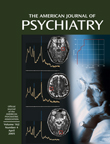Effect of Raloxifene on Prevention of Dementia and Cognitive Impairment in Older Women: The Multiple Outcomes of Raloxifene Evaluation (MORE) Randomized Trial
Abstract
OBJECTIVE: This investigation examined whether raloxifene, a selective estrogen receptor modulator, affects the risk for Alzheimer’s disease. METHOD: The Multiple Outcomes of Raloxifene Evaluation was a randomized, placebo-controlled trial among postmenopausal women with osteoporosis. The effect of raloxifene (60 or 120 mg/day) on vertebral fractures was the primary outcome. Development of mild cognitive impairment and dementia was a secondary outcome. Women were given clinical and cognitive evaluations at baseline and annually. After 3 years, among the 5,386 women enrolled at participating sites, those who had clinical symptoms of dementia or scored in the lowest 10th percentile on cognitive screening were evaluated by a blinded dementia specialist and had brain scans and laboratory tests to evaluate dementia etiology. Dementia was diagnosed by a blinded adjudication committee. RESULTS: Of the 5,386 women, 5,153 (95.7%) were classified as cognitively normal, 181 (3.4%) had mild cognitive impairment, and 52 (1.0%) had dementia, 36 with Alzheimer’s disease. Compared to those taking placebo, women receiving 120 mg/day of raloxifene had a 33% lower risk of mild cognitive impairment (relative risk, 0.67; 95% confidence interval [CI], 0.46–0.98) and somewhat lower risks of Alzheimer’s disease (relative risk=0.52, 95% CI=0.22–1.21) and any cognitive impairment (relative risk=0.73, 95% CI=0.53–1.01). Risks of mild cognitive impairment, Alzheimer’s disease, and any impairment were not significantly different in the group taking 60 mg/day of raloxifene. CONCLUSIONS: Raloxifene at a dose of 120 mg/day, but not 60 mg/day, resulted in reduced risk of cognitive impairment in postmenopausal women.



